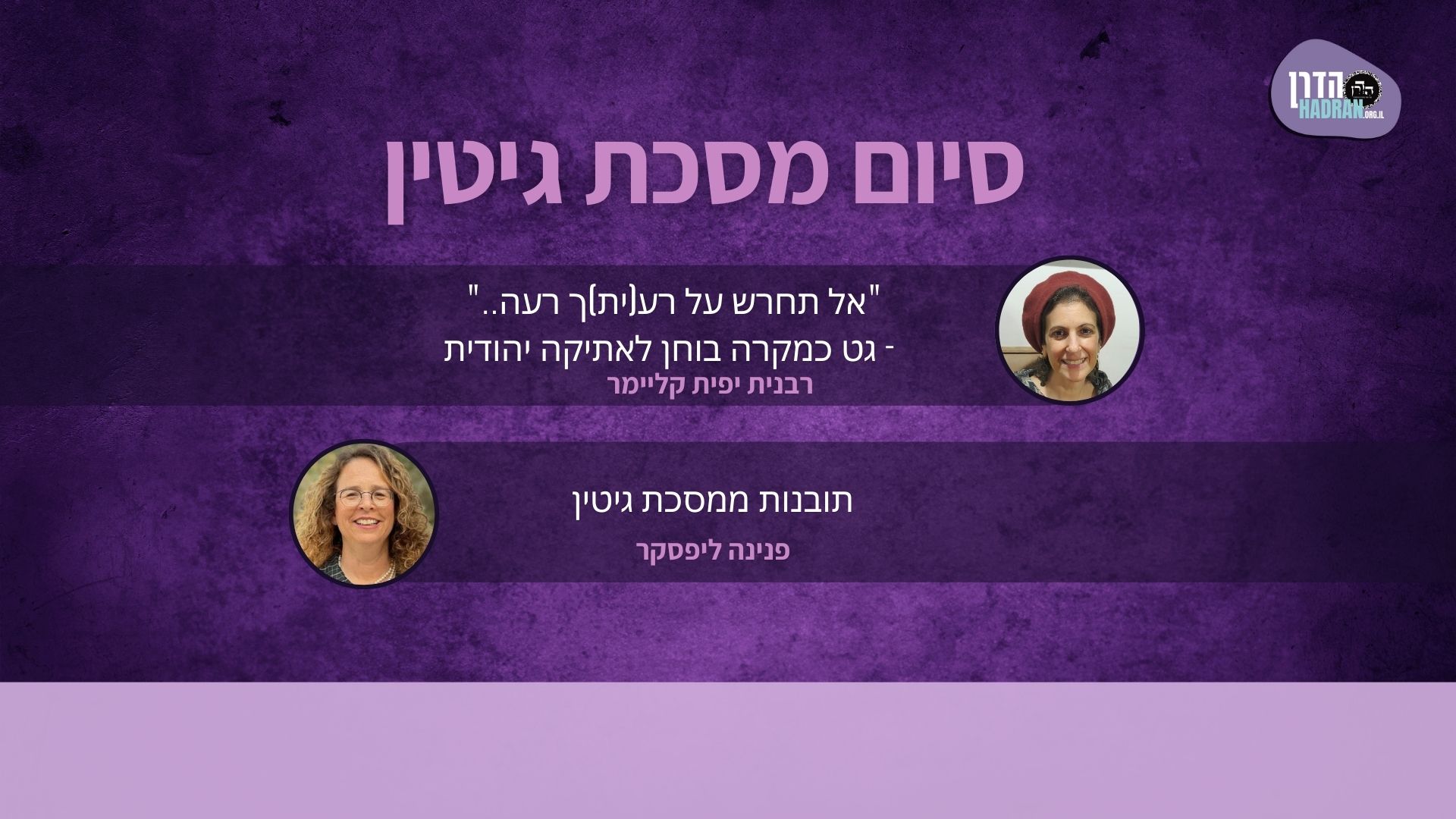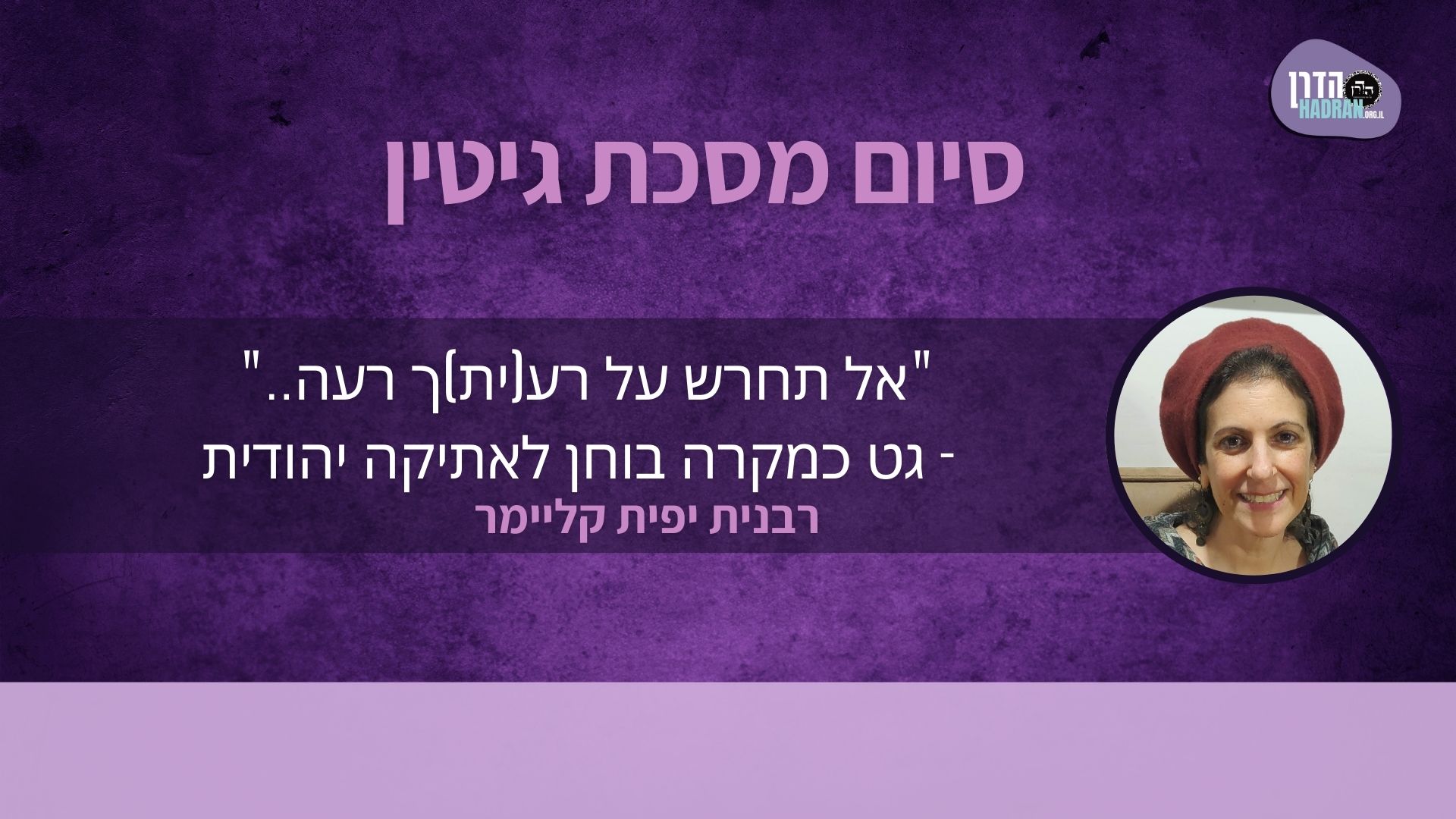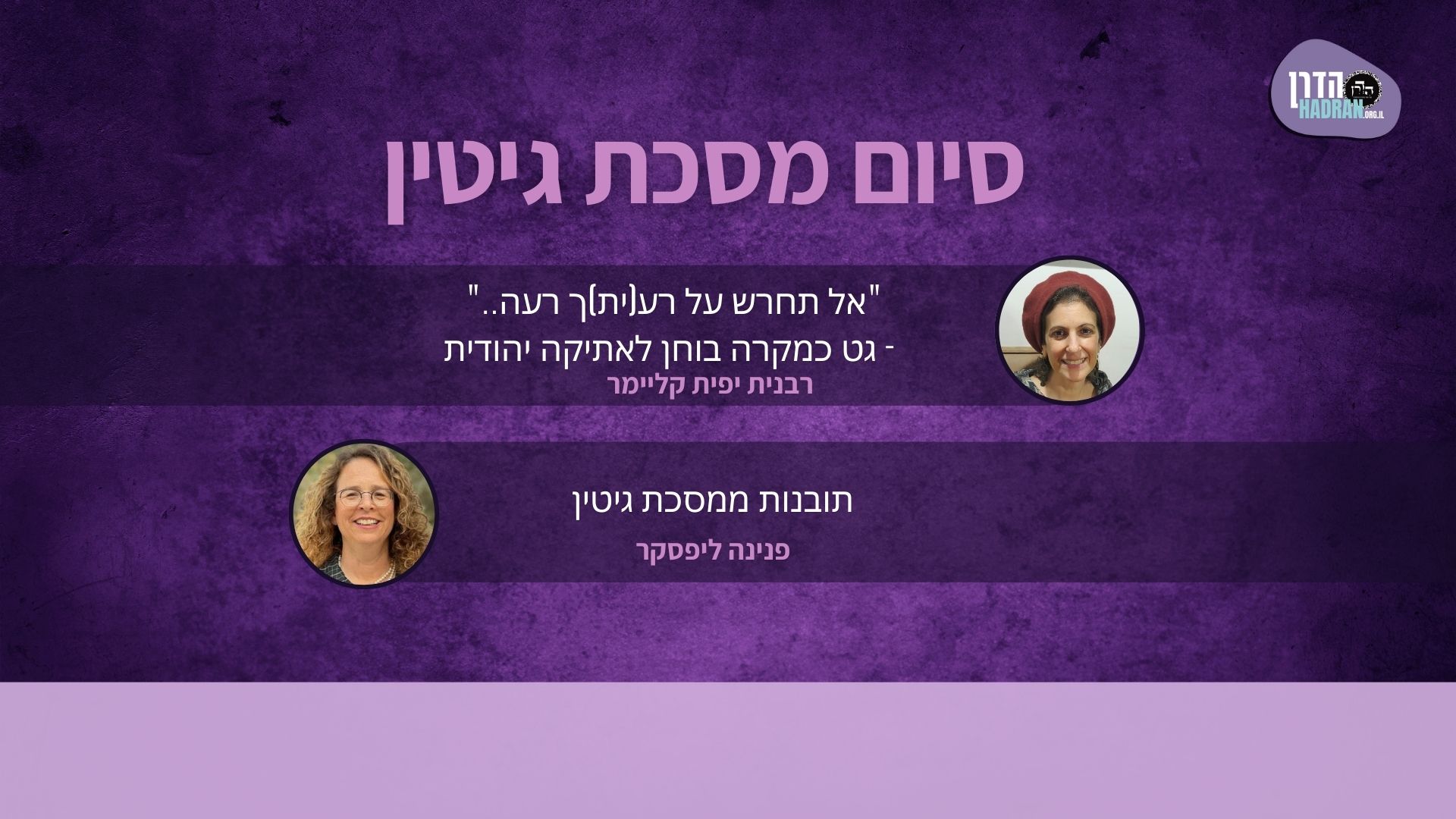הלימוד השבוע מוקדש ע”י רוברט ופאולה כהן לע”נ יוסף בן משה הכהן ז”ל. יוסף היה חזן שאהב מאוד לשיר, עבד קשה בחייו והיה מאוד מסור למשפחתו ולקהילה.
רוצה להקדיש שיעור?

כלים
הלימוד השבוע מוקדש ע”י רוברט ופאולה כהן לע”נ יוסף בן משה הכהן ז”ל. יוסף היה חזן שאהב מאוד לשיר, עבד קשה בחייו והיה מאוד מסור למשפחתו ולקהילה.
כלים
העמקה
רוצה להבין מה באמת קורה מתחת לפני השטח של הסוגיה?
שיעורים, פודקאסטים והרחבות של מיטב המורות שלנו יפתחו לך עוד זוויות וכיווני חשיבה.
חדשה בלימוד הגמרא?
זה הדף הראשון שלך? איזו התרגשות עצומה! יש לנו בדיוק את התכנים והכלים שיעזרו לך לעשות את הצעדים הראשונים ללמידה בקצב וברמה שלך, כך תוכלי להרגיש בנוח גם בתוך הסוגיות המורכבות ומאתגרות.
פסיפס הלומדות שלנו
גלי את קהילת הלומדות שלנו, מגוון נשים, רקעים וסיפורים. כולן חלק מתנועה ומסע מרגש ועוצמתי.
גיטין עט
מַתְנִי׳ הָיְתָה עוֹמֶדֶת עַל רֹאשׁ הַגָּג וּזְרָקוֹ לָהּ, כֵּיוָן שֶׁהִגִּיעַ לַאֲוִיר הַגָּג – הֲרֵי זוֹ מְגוֹרֶשֶׁת. הוּא מִלְּמַעְלָה וְהִיא מִלְּמַטָּה, וּזְרָקוֹ לָהּ, כֵּיוָן שֶׁיָּצָא מֵרְשׁוּת הַגָּג, נִמְחַק אוֹ נִשְׂרַף – הֲרֵי זוֹ מְגוֹרֶשֶׁת.
MISHNA: If a woman was standing on top of the roof and her husband was standing below, and he threw a bill of divorce to her, once the bill of divorce reaches the airspace of the roof, she is divorced. If he was above on the roof and she was below, and he threw it to her, once it leaves the area of the roof, even if the wording was erased or the document was burned before it fell to the ground, she is divorced.
גְּמָ׳ וְהָא לָא מִינְּטַר! אָמַר רַב יְהוּדָה אָמַר שְׁמוּאֵל: בְּגַג שֶׁיֵּשׁ לוֹ מַעֲקֶה עָסְקִינַן.
GEMARA: The Gemara asks: But isn’t the airspace of the roof unsecured? Since the bill of divorce can be blown away from the roof by the wind, it should be considered an unsecured courtyard, which does not acquire items. If so, why is she divorced once the bill of divorce reaches the airspace of the roof? Rav Yehuda said that Shmuel said: We are dealing with a roof that has a parapet. Therefore, it is like a secured courtyard, since the bill of divorce cannot be blown away.
עוּלָּא בַּר מְנַשְּׁיָא מִשְּׁמֵיהּ דַּאֲבִימִי אָמַר: הָכָא בְּפָחוֹת מִשְּׁלֹשָׁה סָמוּךְ לַגַּג עָסְקִינַן, דְּכֹל פָּחוֹת מִשְּׁלֹשָׁה סָמוּךְ לַגַּג – כְּגַג דָּמֵי.
Ulla bar Menashya said in the name of Avimi that there is another answer: Here we are dealing with a case in which the bill of divorce is within three handbreadths of the roof, as anything within three handbreadths of the roof is considered to be like the roof itself, based on the principle that views two solid surfaces as connected if the gap between them is less than three handbreadths wide.
הוּא מִלְּמַעְלָה: וְהָא לָא מִינְּטַר! אָמַר רַב יְהוּדָה אָמַר שְׁמוּאֵל: כְּגוֹן שֶׁהָיוּ מְחִיצוֹת הַתַּחְתּוֹנוֹת עוֹדְפוֹת עַל הָעֶלְיוֹנוֹת.
§ It was taught in the mishna: If he was above and she was below, and he threw the bill of divorce to her, once it leaves the area of the roof, she is divorced. The Gemara asks: But isn’t the airspace of the courtyard not secured, since the bill of divorce can be blown out of the courtyard by the wind? Rav Yehuda says that Shmuel says: We are discussing a case where the lower partitions in the courtyard extend beyond the upper partitions on the roof, so that the bill of divorce will certainly fall in the courtyard.
וְכֵן אָמַר רַבִּי אֶלְעָזָר אָמַר רַבִּי אוֹשַׁעְיָא: כְּגוֹן שֶׁהָיוּ מְחִיצוֹת הַתַּחְתּוֹנוֹת עוֹדְפוֹת עַל הָעֶלְיוֹנוֹת. וְכֵן אָמַר עוּלָּא אָמַר רַבִּי יוֹחָנָן: כְּגוֹן שֶׁהָיוּ מְחִיצוֹת הַתַּחְתּוֹנוֹת עוֹדְפוֹת עַל הָעֶלְיוֹנוֹת.
And so Rabbi Elazar says that Rabbi Oshaya says: We are discussing a case where the lower partitions extend beyond the upper partitions. And so Ulla says that Rabbi Yoḥanan says: We are discussing a case where the lower partitions extend beyond the upper partitions.
אֲמַר לֵיהּ רַבִּי אַבָּא לְעוּלָּא: כְּמַאן, כְּרַבִּי – דְּאָמַר: קְלוּטָה, כְּמִי שֶׁהוּנְּחָה דָּמְיָא?
Rabbi Abba said to Ulla: In accordance with whose opinion is this halakha that once the bill of divorce enters the woman’s domain, it is considered as though it was given to her, even though it was destroyed before it landed on the ground? Is it in accordance with the opinion of Rabbi Yehuda HaNasi, who said that with regard to the prohibition of transferring an item from one domain to another on Shabbat, an object in airspace is considered at rest? This means that any item in the airspace of a domain is considered to be placed within that domain.
אֲמַר לֵיהּ: אֲפִילּוּ תֵּימָא רַבָּנַן – עַד כָּאן לָא פְּלִיגִי רַבָּנַן עֲלֵיהּ דְּרַבִּי, אֶלָּא לְעִנְיַן שַׁבָּת; אֲבָל הָכָא – מִשּׁוּם אִינְּטוֹרֵי הוּא, וְהָא קָא מִינְּטַר.
Ulla said to him: You can even say that the mishna is in accordance with the opinion of the Rabbis, who disagree with Rabbi Yehuda HaNasi, since the Rabbis disagree with Rabbi Yehuda HaNasi only with regard to Shabbat. They maintain that with regard to the halakhot of Shabbat, the item must actually come to rest in the domain to which it was transferred; while it is in the air, it is not considered as though it has landed on the ground. But here, in the case of divorce, it is because the bill of divorce is secured that she is divorced, and in this case it is secured while within the airspace of the partitions.
וְכֵן אָמַר רַבִּי אַסִּי אָמַר רַבִּי יוֹחָנָן: כְּגוֹן שֶׁהָיוּ מְחִיצוֹת הַתַּחְתּוֹנוֹת עוֹדְפוֹת עַל הָעֶלְיוֹנוֹת. אֲמַר לֵיהּ רַבִּי זֵירָא לְרַבִּי אַסִּי: כְּמַאן, כְּרַבִּי – דְּאָמַר: קְלוּטָה כְּמִי שֶׁהוּנְּחָה דָּמְיָא?
And so Rabbi Asi says that Rabbi Yoḥanan says: We are discussing a case where the lower partitions in the courtyard extend beyond the upper partitions on the roof. Rabbi Zeira said to Rabbi Asi: In accordance with whose opinion is this halakha? Is it in accordance with the opinion of Rabbi Yehuda HaNasi, who says that an object in airspace is considered at rest?
אֲמַר לֵיהּ: אֲפִילּוּ תֵּימָא רַבָּנַן – עַד כָּאן לָא פְּלִיגִי רַבָּנַן עֲלֵיהּ דְּרַבִּי, אֶלָּא לְעִנְיַן שַׁבָּת; אֲבָל הָכָא – מִשּׁוּם אִינְּטוֹרֵי הוּא, וְהָא קָא מִינְּטַר.
Rabbi Asi said to him: You can even say that the mishna is in accordance with the opinion of the Rabbis, since the Rabbis disagree with Rabbi Yehuda HaNasi only with regard to Shabbat. But here, it is because the bill of divorce is secured that she is divorced, and in this case it is secured while within the airspace of the partitions.
נִמְחַק: אָמַר רַב נַחְמָן אָמַר רַבָּה בַּר אֲבוּהּ: לֹא שָׁנוּ אֶלָּא שֶׁנִּמְחַק דֶּרֶךְ יְרִידָה, אֲבָל נִמְחַק דֶּרֶךְ עֲלִיָּיה – לָא. מַאי טַעְמָא? מֵעִיקָּרָא לָא לְמֵינַח קָאֵי.
§ It was taught in the mishna that once the bill of divorce leaves the domain of the roof, even if the writing was erased before it reached her hand, she is divorced with it. Rav Naḥman says that Rabba bar Avuh says: They taught this halakha only when the writing was erased when it had already left the confines of the roof and was on its descent, entering her domain. But if the writing was erased while it was on its ascent, i.e., as it arched upward before falling down, then no, she is not divorced. What is the reason for this? Because initially, before it began its descent, the bill of divorce is not destined to land in her domain, since it could be blown elsewhere. Consequently, it cannot be considered as though it is already resting in her courtyard at that time.
נִשְׂרַף: אָמַר רַב נַחְמָן אָמַר רַבָּה בַּר אֲבוּהּ: לֹא שָׁנוּ אֶלָּא שֶׁקָּדַם גֵּט לִדְלֵיקָה, אֲבָל קָדְמָה דְּלֵיקָה לְגֵט – לָא. מַאי טַעְמָא? מֵעִיקָּרָא לִשְׂרֵיפָה קָאָזֵיל.
It was taught in the mishna that once the bill of divorce leaves the domain of the roof, even if the document was burned before it reached her hand, she is divorced with it. Here, as well, Rav Naḥman says that Rabba bar Avuh says: They taught this halakha only when the throwing of the bill of divorce preceded the fire. But if the fire preceded the throwing of the bill of divorce, then the woman is not divorced. What is the reason for this? Because initially, when the bill of divorce was thrown, it was heading toward being burned, and therefore it is considered that he never gave her a bill of divorce.
אָמַר רַב חִסְדָּא: רְשׁוּיוֹת חֲלוּקוֹת בְּגִיטִּין.
§ Rav Ḥisda says: Domains are divided with regard to bills of divorce. If there are several areas within the same domain, e.g., a house and a courtyard, or a courtyard and a roof, they are not all considered a single domain with regard to bills of divorce. Rather, each one is considered to be a separate domain.
אֲמַר לֵיהּ רָמֵי בַּר חָמָא לְרָבָא: מְנָא לֵיהּ לְסָבָא הָא? אֲמַר לֵיהּ, מַתְנִיתִין הִיא: הָיְתָה עוֹמֶדֶת עַל רֹאשׁ הַגָּג וּזְרָקוֹ לָהּ, כֵּיוָן שֶׁהִגִּיעַ גֵּט לַאֲוִיר הַגָּג – הֲרֵי זוֹ מְגוֹרֶשֶׁת.
Rami bar Ḥama said to Rava: From where does the Elder, i.e., Rav Ḥisda, derive this halakha? Rava said to him: It is derived from the mishna that taught: If the woman was standing on the top of the roof and her husband threw a bill of divorce to her from below, once the bill of divorce reaches the airspace of the roof, she is divorced.
בְּמַאי עָסְקִינַן? אִילֵימָא בְּגַג דִּידַהּ וְחָצֵר דִּידַהּ, לְמָה לִי אֲוִיר הַגָּג?
Rava explains: With what are we dealing? If we say that we are dealing with a case of her roof and her courtyard, why do I require the bill of divorce to reach the airspace of the roof in order for her to be divorced? Even if the bill of divorce remained in the courtyard, she would be divorced, since it is her courtyard.
אֶלָּא בְּגַג דִּידֵיהּ וְחָצֵר דִּידֵיהּ, כִּי הִגִּיעַ לַאֲוִיר הַגָּג מַאי הָוֵי?
Rather, we must be dealing with a case of his roof and his courtyard. But when the bill of divorce reaches the airspace of the roof, what of it? Why is she then divorced, if the bill of divorce has not left his domain?
אֶלָּא פְּשִׁיטָא – בְּגַג דִּידַהּ וְחָצֵר דִּידֵיהּ. אֵימָא סֵיפָא: הוּא מִלְּמַעְלָה וְהִיא מִלְּמַטָּה וּזְרָקוֹ לָהּ; כֵּיוָן שֶׁיָּצָא מֵרְשׁוּת הַגָּג, נִמְחַק אוֹ נִשְׂרַף – הֲרֵי זוֹ מְגוֹרֶשֶׁת. וְאִי בְּגַג דִּידַהּ וְחָצֵר דִּידֵיהּ, אַמַּאי מְגוֹרֶשֶׁת? אֶלָּא בְּגַג דִּידֵיהּ וְחָצֵר דִּידַהּ;
Rather, it is obvious that we are dealing with a case of her roof and his courtyard. Rava questions this conclusion: Say the latter clause of the mishna, which taught: If he was above on the roof and she was below, and he threw it to her, once it leaves the area of the roof, even if the wording was erased or the document was burned before it fell to the ground, she is divorced. And if we are dealing with a case of her roof and his courtyard, why is she divorced? Rather, it is necessary to say that we are dealing with a case of his roof and her courtyard.
רֵישָׁא בְּגַג דִּידַהּ וְחָצֵר דִּידֵיהּ, סֵיפָא בְּגַג דִּידֵיהּ וְחָצֵר דִּידַהּ?!
Rava asks: Is it possible that the first clause in the mishna is dealing with a case of her roof and his courtyard, and the latter clause in the mishna is dealing with a case of his roof and her courtyard? How could the same mishna discuss two halakhot where each one is dealing with a different reality, without mentioning this distinction?
אֶלָּא לָאו דְּאוֹשְׁלַהּ מָקוֹם – דְּחַד מָקוֹם מוֹשְׁלִי אִינָשֵׁי, תְּרֵי מְקוֹמוֹת לָא מוֹשְׁלִי אִינָשֵׁי?
Rava explains Rav Ḥisda’s inference: Rather, is it not so that the mishna is dealing with a case where both the roof and the courtyard belong to him, but he lent her a place in his domain wherein she could acquire her bill of divorce, and she is standing in that place? In the first clause he lent her the roof, and in the second clause he lent her the courtyard, Consequently, only once it reaches that domain is she divorced. The reason why she does not acquire the bill of divorce until it reaches the specific domain that he lent her is that people lend only one place; people do not lend two places. Rav Ḥisda understood that one can infer from the mishna that the courtyard and roof remain as separate domains, and concludes that, with regard to bills of divorce, different areas in one domain are considered to be multiple domains.
אֲמַר לֵיהּ: מִידֵי אִירְיָא?! דִּלְמָא הָא כִּדְאִיתַהּ וְהָא כִּדְאִיתַהּ – רֵישָׁא בְּגַג דִּידַהּ וְחָצֵר דִּידֵיהּ, סֵיפָא בְּגַג דִּידֵיהּ וְחָצֵר דִּידַהּ.
Rami bar Ḥama said to Rava: Are the cases comparable? Perhaps this case is as it is and that case is as it is, i.e., the first clause in the mishna is dealing with a case of her roof and his courtyard, and the latter clause is dealing with a case of his roof and her courtyard. In some instances, one mishna deals with two different cases. Therefore, the mishna is not an adequate proof for Rav Ḥisda’s statement.
אָמַר רָבָא: שָׁלֹשׁ מִדּוֹת בְּגִיטִּין; הָא דְּאָמַר רַבִּי: קְלוּטָה כְּמִי שֶׁהוּנְּחָה, וּפְלִיגִי רַבָּנַן עָלֶיהָ – הָנֵי מִילֵּי לְעִנְיַן שַׁבָּת, אֲבָל הָכָא מִשּׁוּם אִינְּטוֹרֵי הוּא, וְהָא מִינְּטַר;
Rava says: There are three unique qualities with regard to bills of divorce, as compared to the halakhot of Shabbat. The first is that which Rabbi Yehuda HaNasi says: An object in airspace is considered at rest; and the Rabbis disagree with him. This matter about which they disagree applies only with regard to Shabbat. But here, in the case of divorce, it is because the bill of divorce is secured that she is divorced; and once the bill of divorce is within the airspace of the partitions, it is secured and the Rabbis agree that she is divorced.
וְהָא דְּאָמַר רַב חִסְדָּא: נָעַץ קָנֶה בִּרְשׁוּת הַיָּחִיד וּבְרֹאשׁוֹ טְרַסְקָל, וְזָרַק וְנָח עַל גַּבָּיו – אֲפִילּוּ גָּבוֹהַּ מֵאָה אַמָּה, חַיָּיב, לְפִי שֶׁרְשׁוּת הַיָּחִיד עוֹלָה עַד לָרָקִיעַ – הָנֵי מִילֵּי לְעִנְיַן שַׁבָּת, אֲבָל הָכָא מִשּׁוּם אִינְּטוֹרֵי הוּא, וְהָא לָא מִינְּטַר;
And the second matter is that which Rav Ḥisda says concerning the halakhot of Shabbat: In the case of one who embedded a reed in the ground of a private domain, and on its top was a basket [teraskal], and he threw an object from the public domain and it rested on top of it, even if the reed was a hundred cubits high, he is liable because the private domain extends upward until the sky. Therefore, the object landed in a private domain. This matter applies only with regard to Shabbat, as with regard to Shabbat domains are defined based on their partitions and the way in which they are used, which differs from the way domains are defined in other halakhic areas. But here, in the case of divorce, it is because the bill of divorce is secured that she is divorced, and when it is on the reed it is not secured.
וְהָא דְּאָמַר רַב יְהוּדָה אָמַר שְׁמוּאֵל: לֹא יַעֲמוֹד אָדָם בְּגַג זֶה וְיִקְלוֹט מֵי גְשָׁמִים מִגַּגּוֹ שֶׁל חֲבֵירוֹ, שֶׁכְּשֵׁם שֶׁדִּיּוּרִין חֲלוּקִין מִלְּמַטָּה, כָּךְ דִּיּוּרִין חֲלוּקִין מִלְּמַעְלָה –
And the third matter relates to that which Rav Yehuda says that Shmuel says: On Shabbat a person should not stand on this roof and collect rainwater from the roof of another if there is no joining of courtyards. As just as the residences are separated below, so too, the residences are separated above. Each residence has a separate domain, and it is forbidden by rabbinic law to transfer an item from a private domain to another private domain if they are not joined. Similarly, despite the fact that the roofs are not totally separated from one another and nobody lives there, each roof is considered to be its own domain.
הָנֵי מִילֵּי לְעִנְיַן שַׁבָּת, אֲבָל לְעִנְיַן גֵּט – מִשּׁוּם קְפִידָא הוּא, וְכוּלֵּי הַאי לָא קָפְדִי אִינָשֵׁי.
Rava explains: This matter applies only with regard to Shabbat. But with regard to a bill of divorce, if it fell onto another roof that is adjacent to the roof that he lent her for the purpose of acquiring the bill of divorce, she is divorced. The reason that a woman is usually not divorced when a bill of divorce falls into a different place, even though that place also belongs to her husband, is due to the fact that a husband is particular and does not want to lend her more than one place; but people are not particular to that extent, i.e., in this case the husband would not be particular about allowing her to temporarily use an adjacent rooftop that also belongs to him.
אָמַר אַבָּיֵי: שְׁתֵּי חֲצֵרוֹת זוֹ לִפְנִים מִזּוֹ, פְּנִימִית שֶׁלָּהּ וְחִיצוֹנָה שֶׁלּוֹ, וּמְחִיצוֹת הַחִיצוֹנוֹת עוֹדְפוֹת עַל הַפְּנִימִיּוֹת; וּזְרָקוֹ לָהּ; כֵּיוָן שֶׁהִגִּיעַ לַאֲוִיר מְחִיצוֹת הַחִיצוֹנָה – הֲרֵי זוֹ מְגוֹרֶשֶׁת.
§ Abaye says: If there are two courtyards that are configured such that this courtyard is within that courtyard, and the inner courtyard is hers and the outer courtyard is his, and the partitions of the outer courtyard extend higher than the partitions of the inner courtyard, and he threw a bill of divorce to her into her courtyard, once it reaches the airspace of the partitions of the outer courtyard, i.e., it reaches the area above the inner courtyard at a height lower than the height of the partitions of the outer courtyard, she is divorced.
מַאי טַעְמָא? פְּנִימִית גּוּפַהּ – בִּמְחִיצוֹת הַחִיצוֹנָה קָא מִינַּטְרָה.
What is the reason for this? The inner courtyard itself is secured by the partitions of the outer courtyard. Therefore, the outer partitions service the inner courtyard as well. If the bill of divorce is secured by being encompassed by the outer partitions, it can be viewed as belonging to the inner courtyard once it reaches its airspace.
מַה שֶּׁאֵין כֵּן בְּקוּפּוֹת – שְׁתֵּי קוּפּוֹת זוֹ בְּתוֹךְ זוֹ, פְּנִימִית שֶׁלָּהּ וְחִיצוֹנָה שֶׁלּוֹ; וּזְרָקוֹ לָהּ; אֲפִילּוּ הִגִּיעַ לַאֲוִיר פְּנִימִית – אֵינָהּ מְגוֹרֶשֶׁת.
The Gemara comments: This is not so with regard to baskets. In a case where there were two baskets, this one within that one, resting in a domain that does not belong to either of them, and the inner basket is hers and the outer basket is his, and he threw a bill if divorce to her into her basket, even if the bill of divorce reached the airspace of the inner basket but was burned or taken before it landed therein, she is not divorced.
מַאי טַעְמָא? דְּהָא לָא נָח.
What is the reason for this? It is because the bill of divorce did not yet rest within the basket, and in this case, the walls of the outer basket do not service the inner basket.
וְכִי נָח מַאי הָוֵי? כִּלְיוֹ שֶׁל לוֹקֵחַ בִּרְשׁוּת מוֹכֵר הוּא!
The Gemara asks: And when it rests within the basket, what of it? They are like the vessels of a buyer in the domain of the seller, since her basket is within his basket, which is his domain. She cannot acquire the bill of divorce, despite the fact that it is in her basket, since it is within his domain.
הָכָא בְּמַאי עָסְקִינַן – בְּקוּפָּה שֶׁאֵין לָהּ שׁוּלַיִים.
The Gemara answers: With what are we dealing here? With a basket that has no bottom, and consequently the inner basket is resting on the ground and not inside the outer basket. Therefore, once the bill of divorce lands inside the inner basket, she is indeed divorced.
מַתְנִי׳ בֵּית שַׁמַּאי אוֹמְרִים: פּוֹטֵר אָדָם אִשְׁתּוֹ בְּגֵט יָשָׁן. וּבֵית הִלֵּל אוֹסְרִין. וְאֵיזֶהוּ גֵּט יָשָׁן – כֹּל שֶׁנִּתְיַיחֵד עִמָּהּ מֵאַחַר שֶׁכְּתָבוֹ לָהּ.
MISHNA: Beit Shammai say: A man may send, i.e., divorce, his wife with an outdated bill of divorce, and Beit Hillel prohibit him from doing so. And what is an outdated bill of divorce? Any case where he was secluded with her after he wrote it for her and before he gave it to her.
גְּמָ׳ בְּמַאי קָמִיפַּלְגִי? בֵּית שַׁמַּאי סָבְרִי: לָא אָמְרִינַן גְּזֵרָה שֶׁמָּא יֹאמְרוּ גִּיטָּהּ קוֹדֵם לִבְנָהּ;
GEMARA: The Gemara explains: With regard to what do they disagree? Beit Shammai hold that we do not say that the bill of divorce is not valid due to a rabbinic decree, lest they say that receipt of her bill of divorce precedes conception of her son. If he gives her the bill of divorce long after it was written, she may give birth to children from him in the interim. There is a concern that people will say that she was actually divorced on the date written on the bill of divorce before the children were born, and the children were conceived through licentious sexual intercourse.
וּבֵית הִלֵּל סָבְרִי: אָמְרִינַן גְּזֵרָה שֶׁמָּא יֹאמְרוּ גִּיטָּהּ קוֹדֵם לִבְנָהּ.
And Beit Hillel hold that we do say that this bill of divorce is not valid due to a rabbinic decree, lest they say that receipt of her bill of divorce precedes conception of her son. Consequently, if a woman was secluded with her husband following the writing of the bill of divorce, the bill of divorce is not valid.
אָמַר רַבִּי אַבָּא אָמַר שְׁמוּאֵל: אִם נִישֵּׂאת, לֹא תֵּצֵא.
Rabbi Abba says that Shmuel says: Even according to Beit Hillel, if the woman was married on the basis of an outdated bill of divorce given to her by her previous husband, who did not ask advice from the rabbis, she need not leave her second husband. In such a case, this decree is not severe enough to invalidate the bill of divorce.
וְאִיכָּא דְּאָמְרִי, אָמַר רַבִּי אַבָּא אָמַר שְׁמוּאֵל: אִם נִתְגָּרְשָׁה, תִּינָּשֵׂא לְכַתְּחִלָּה.
And there are those who say that Rabbi Abba says that Shmuel says: If she was divorced with an outdated bill of divorce, this woman can marry even ab initio on the basis of this bill of divorce. There is no requirement for her to wait for her first husband to write her a new bill of divorce.
מַתְנִי׳ כָּתַב לְשׁוּם מַלְכוּת שֶׁאֵינָהּ הוֹגֶנֶת; לְשׁוּם מַלְכוּת מָדַי; לְשׁוּם מַלְכוּת יָוָן; לְבִנְיַן הַבַּיִת; לְחוּרְבַּן הַבַּיִת;
MISHNA: If he wrote the date on the bill of divorce using a calendrical system that counts years in the name of a kingdom that is not legitimate, or he wrote the date in the name of the kingdom of Media, or in the name of the Greek Empire, after it ceased to exist, or he wrote the date counting to the building of the Temple, or counting to the destruction of the Temple, in all these case, the bill of divorce is not valid. In the time of the mishna, the local government was particular that documents be dated with the official government date. Therefore, the Sages instituted that this must be done in bills of divorce as well. If one deviates from this practice, the rabbinic dictates of bills of divorce have been violated, and the bill of divorce is invalid.
הָיָה בַּמִּזְרָח וְכָתַב בַּמַּעֲרָב; בַּמַּעֲרָב וְכָתַב בַּמִּזְרָח – תֵּצֵא מִזֶּה וּמִזֶּה, וּצְרִיכָה גֵּט מִזֶּה וּמִזֶּה.
If he was in the east and he wrote the location in the bill of divorce as in the west, or if he was in the west and he wrote the location in the bill of divorce as in the east, the bill of divorce is not valid. If he divorced her with this bill of divorce and she remarried, she must leave both this first husband and that second husband, and she needs a bill of divorce from this husband and that husband.
וְאֵין לָהּ לֹא כְּתוּבָּה וְלֹא פֵּירוֹת וְלֹא מְזוֹנוֹת וְלֹא בְּלָאוֹת – לֹא עַל זֶה, וְלֹא עַל זֶה.
And she does not receive payment of her marriage contract, and not the profits from her properties that her husband consumed, and she does not have a claim to receive sustenance, and she does not have a claim to worn clothes that belonged to her, but which her husband used. She cannot demand these items, not of this husband and not of that husband.
אִם נָטְלָה מִזֶּה וּמִזֶּה – תַּחְזִיר. וְהַוָּלָד מַמְזֵר מִזֶּה וּמִזֶּה. וְלֹא זֶה וָזֶה מְטַמְּאִין לָהּ, וְלֹא זֶה וָזֶה זַכָּאִין – לֹא בִּמְצִיאָתָהּ וְלֹא בְּמַעֲשֵׂה יָדֶיהָ וְלֹא בַּהֲפָרַת נְדָרֶיהָ.
If she took any of these items from this husband or from that husband, she must return what was taken. And the child that was born from this husband or from that husband that was conceived after she married the second husband is a son born from an adulterous relationship [mamzer]. And neither this husband nor that husband, if they are priests, is permitted to become ritually impure by her when she dies, which a husband may ordinarily do for his wife. And neither this husband nor that husband have the rights to objects she finds, or to her earnings, or to the annulment of her vows.
הָיְתָה בַּת יִשְׂרָאֵל – נִפְסֶלֶת מִן הַכְּהוּנָּה.
If she was an Israelite woman, then through these two marriages she becomes disqualified from marrying into the priesthood, due to the prohibition against a priest marrying a zona.






































